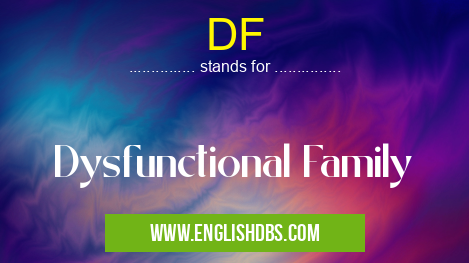What does DF mean in UNCLASSIFIED
Dysfunctional Family, or DF, encompasses the many different types of families who, due to various internal issues, may not function in an ideal manner. These issues could range from behavioral problems to communication issues to substance abuse and beyond. Regardless of the cause, a Dysfunctional Family can have long-term negative effects on its members and can make it difficult for them to lead productive and successful lives. It is important to understand the dynamics of a Dysfunctional Family in order to effectively address this issue and create healthier family environments.

DF meaning in Unclassified in Miscellaneous
DF mostly used in an acronym Unclassified in Category Miscellaneous that means Dysfunctional Family
Shorthand: DF,
Full Form: Dysfunctional Family
For more information of "Dysfunctional Family", see the section below.
Definition
DF stands for Dysfunctional Family. A Dysfunctional Family is one in which members exhibit behaviors or engage in patterns of interaction that are problematic, unhealthy or destructive. This can include things like parents being overly authoritarian or indulgent; communication difficulties; unfulfilled emotional needs; unresolved conflict; physical or verbal aggression; substance abuse; mental illness; neglectful parenting; poverty or financial insecurity; sibling rivalry; restricted emotional expression and more.
Impacts
Unfortunately, dysfunctional family relationships can have long-lasting impacts on individuals even well into adulthood. Members may feel as if they can't measure up no matter what they do, leading to feelings of shame and inadequacy that hinder their ability to form healthy connections with others later on in life. Furthermore, adults who grew up in dysfunctional households often struggle with developing trust in others, setting boundaries with people and forming healthy relationships both platonic and romantic.
Help
If you find yourself struggling with the effects of growing up in a Dysfunctional Family, there are ways you can seek help and work through your issues. Seeking therapy from a trained professional who specializes in this type of work can be beneficial in navigating these complexities emotions that may come up during the healing process. Additionally, talking openly about your experiences with supportive family members or friends may also be helpful as you learn how best to cope with your past experiences.
Essential Questions and Answers on Dysfunctional Family in "MISCELLANEOUS»UNFILED"
What is a dysfunctional family?
A dysfunctional family is one in which conflict, misbehavior, and often child neglect or abuse on the part of individual parents occur regularly and regularly go unresolved. This creates a hostile environment where members may not feel safe expressing their opinions or feelings. Dysfunctional families are not necessarily broken; rather, they might just have difficulty functioning properly as a unit.
Are all families dysfunctional?
Not every family is dysfunctional, although there may be underlying issues that could cause some distress. It's important to remember that even healthy families can have problems from time to time.
How do I know if my family is dysfunctional?
Look for patterns of behavior within your family system such as emotional or physical distancing, abrasive language or insulting remarks, an inability to communicate freely and openly with each other and unequal distribution of parental attention or support among siblings.
How can I tell if I grew up in a dysfunctional family?
If you experienced any kind of mistreatment such as emotional abuse, physical abuse or neglect while growing up it may indicate that you were raised in dysfunctionally. Other signs include consistently feeling unsafe at home, feelings of guilt when communicating your needs and feeling socially isolated from the outside world.
Are there long-term effects of growing up in a dysfunctional family?
Long-term effects of living in a dysfucntional environment can include difficulties with forming healthy relationships with others, low self-esteem and depression/anxiety due to experiences with mistrust, loss of control and lack of acceptance. Other effects include difficulty managing emotions and difficulty trusting people outside the family unit.
How does being part of a dysfunctional family affect children?
Children growing up in this type of environment are likely to experience anxiety and depression due to difficult experiences like having unmet needs or parental negligence. They may struggle academically because they weren't supported enough at home and may even engage in high risk behaviors such as drug use because they believe no one will notice or care if they do so. Additionally these children may struggle with intimacy later on in life due to trouble building healthy relationships with others.
Is it possible to heal after being part of a dysfunctional family?
It is definitely possible to heal after being part of a dysfunctional family dynamic but it takes time and patience - both from yourself as well as those around you who wish to support your recovery process. Therapy can be very beneficial for understanding what happened and developing coping strategies for dealing with any challenges that arise in the future related to this experience
Final Words:
Growing up in a Dysfunctional Family can have profound mental health implications for its members which unfold over their lifetime if left unaddressed. While it's understandable why addressing this issue might be uncomfortable at first, doing so is integral for creating healthier family dynamics now and living happier lives later on down the road. With self-care practices such as therapy or talking it out with trusted confidantes, help is available when needed no matter where you are in your journey towards healing.
DF also stands for: |
|
| All stands for DF |
